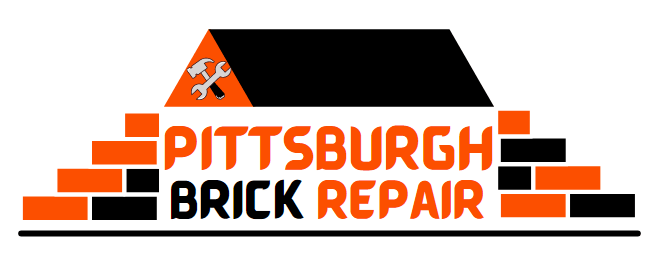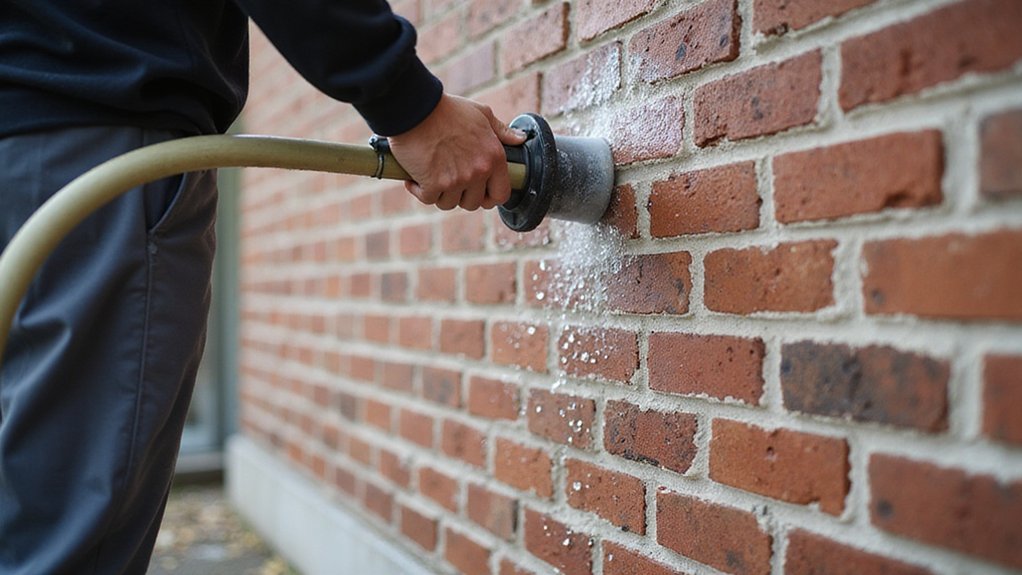Water can silently destroy your home’s masonry, causing expensive structural damage that might go undetected until it’s too late. You’ll want to safeguard your investment and avert costly repairs by comprehending how moisture impacts brick, stone, and concrete surfaces. Uncover seven critical strategies that will help you shield your masonry from water’s destructive potential and guarantee your home remains strong and dry.
Apply High-Quality Waterproofing Sealants
When water seeps into masonry, it can cause significant damage that’s both costly and frustrating. High-quality waterproofing sealants are your first line of defense against moisture intrusion. You’ll want to carefully select a sealant that can weatherproof basement walls and prevent freeze-thaw damage, which can crack and weaken your masonry structures. Tuckpointing and foundation repair professionals in Pittsburgh recommend regular maintenance to prevent water-related structural issues. Professional-grade sealants create a protective barrier that stops water from penetrating brick, stone, and concrete surfaces. By applying these sealants correctly, you’ll safeguard your home’s foundation and exterior walls from potential water-related deterioration. Invest in quality protection now to avoid expensive repairs later.
Maintain and Repair Mortar Joints
After protecting your masonry with waterproofing sealants, you’ll want to focus on another critical aspect of masonry preservation: maintaining and repairing mortar joints. Keeping these joints in top condition helps prevent cracking and moisture infiltration. Tuckpointing every 15-20 years is recommended to prevent serious damage to your building’s structure.
Consider these essential maintenance steps:
- Inspect joints regularly for signs of wear
- Remove efflorescence using specialized cleaning solutions
- Fill small cracks with matching mortar
- Replace severely damaged sections promptly
Install Proper Drainage Systems
The vulnerability of masonry to water damage makes proper drainage systems a critical defense mechanism. You’ll want to guarantee your property’s grade elevation slopes away from your foundation, helping manage moisture levels effectively.
By creating strategic water runoff paths, you can safeguard your walls from potential water infiltration and structural deterioration. Gutters, downspouts, and French drains are excellent solutions that channel water away from your masonry surfaces.
Don’t underestimate the importance of these drainage strategies—they’re your first line of defense against moisture-related damage.
Use Protective Surface Coatings
Protective surface coatings serve as an essential shield against water damage in masonry structures, effectively blocking moisture penetration and extending your wall’s longevity. By strategically applying moisture resistant paints and incorporating hydrophobic admixtures, you’ll create a sturdy defense system for your masonry.
Consider these protective options:
- Clear silane/siloxane sealers that repel water
- Breathable acrylic coatings with waterproofing properties
- Penetrating concrete and brick sealants
- Elastomeric waterproofing membranes
These solutions won’t just protect your walls; they’ll preserve your investment and prevent costly water-related repairs. Your masonry deserves all-encompassing protection against moisture’s destructive potential.
Manage Landscape and Water Runoff
While water damage can silently compromise your masonry’s structural integrity, strategic terrain management offers a critical defense mechanism against moisture infiltration.
You’ll want to mulch terrain areas near your home’s foundation to reduce water absorption and protect your masonry walls. Carefully grade ground away from your building’s base, ensuring water flows downhill and doesn’t pool around your foundation. By creating a gentle slope that directs water from your structure, you’ll minimize potential moisture penetration risks. Proper landscape design acts as a proactive shield, preventing water-related structural damage before it starts.
Address Roof and Gutter Issues
When gutters fail, they can become a silent threat to your home’s masonry integrity. Protecting your walls starts with careful maintenance and proactive inspection. You’ll want to:
- Check for sagging or misaligned gutters
- Look for water stains on exterior walls
- Examine roof condition for damaged shingles
- Inspect gutters for debris and blockages
Regular gutter maintenance prevents water from cascading down your masonry, which can cause serious structural damage. By taking these simple steps, you’ll safeguard your home’s foundation and preserve its beauty. Don’t let neglected gutters compromise your property’s integrity—stay vigilant and address potential issues promptly.
Conduct Regular Professional Inspections
Beyond maintaining gutters, protecting your masonry requires professional skills that can spot hidden risks. You’ll want to schedule thorough assessments with experienced masonry experts who understand structural vulnerabilities.
These professionals can detect early signs of water damage that might escape an untrained eye, preventing costly repairs down the line. Proactive maintenance through regular inspections helps you catch potential issues before they become serious problems.
Frequently Asked Questions
How Long Do Waterproofing Sealants Typically Last on Masonry Surfaces?
You’ll find most quality waterproofing sealants last 5-10 years when you follow proper application techniques and stay within the manufacturer’s warranty period. Regular maintenance can help extend protection.
Can I Apply Waterproofing Treatments Myself or Need Professional Help?
You can DIY waterproofing, but professional application offers superior protection. Complex surface prep and precise product selection make expert services more reliable, ensuring your masonry stays protected long-term.
What Are Signs of Advanced Water Damage in Masonry Walls?
You’ll spot advanced water damage through visible efflorescence, white salt deposits, and crumbling mortar joints. These warning signs mean your masonry’s integrity is compromised and needs immediate professional assessment.
Are Certain Types of Masonry More Vulnerable to Water Damage?
Porous masonry types like soft brick and limestone are more vulnerable to water damage, while dense masonry types like granite and concrete resist moisture better. You’ll want to choose wisely for long-lasting protection.
How Much Does Comprehensive Masonry Water Protection Typically Cost?
You’ll find average project costs for masonry water protection range from $500 to $3,000, with typical professional rates between $50 and $150 per hour, depending on your home’s specific needs and complexity.

